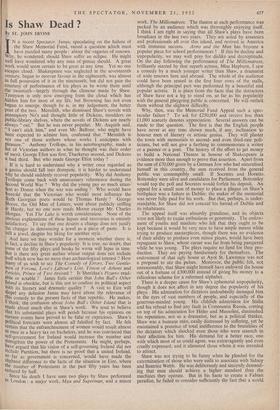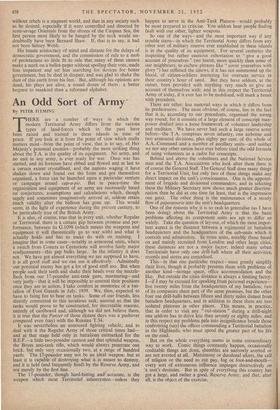Is Shaw Dead ?
ay ST. JOHN ERVINE IN a recent Spectator, Janus, speculating on the failure of the Shaw Memorial Fund, raised a question which must have puzzled many people : about the vagaries of renown. Why, he wondered, should Shaw suffer an eclipse. He might well have wondered why any man of genius should. A great work would seem certain to be great at any time. Yet no one escapes cloud. Shakespeare was neglected in the seventeenth century, began to recover favour in the eighteenth, was almost
I
n full possession of it in the nineteenth, bat did not gain the courtesy of performance of his plays as he wrote them until i the twentieth—largely through the clamour made by Shaw. fennysdn is only now emerging from the cloud which has '.:hidden him 'for most of my life, but Browning has not even )egun to emerge, though he is, in my judgement, the better Poet of the two. Meredith, who dismissed Shaw's novels with Peremptory No's and thought little of Dickens, moulders, on . public-library shelves, where the novels of Dickens are nearly always " out." But he was never popular. Mr. Asquith said, " I can't stick him," and even Mr. Balfour, who might have been expected to admire him, confessed that " Meredith is not one of those authors whose works I anticipate with pleasure." Anthony Trollope, in his autobiography, made a list of Victorian authors in what he thought was their order of merit. George Eliot was first, Thackeray second, and Dickens a bad third. But who reads George Eliot today ?
If it is hard to understand why a writer once regarded as genius should fall into disrepute, it is harder to understand why he should suddenly recover popularity. Why did Anthony Trollope come back with unnecessary vehemence during the Second World War ? Why did the young pay so much Wen: !ion to Donne when the war was ending '? Who would have foretold that the Victorian who would most influence the Sixth Georgian poets would be Thomas Hardy ? George Moore, the Old Man of Letters, went about publicly sniffing 4 Hardy, but no one now reads Moore except Mr. Charles Horgan. Yet. The Lake is worth consideration. None of the )bvious explanations of these lapses and recoveries is entirely satisfactory. To say that one desires a change does not justify be changer in denouncing a jewel as a piece of paste. It is still a jewel, despite his liking for another style.
And here we may wonder for a moment whether there is, in fact, a decline in Shaw's popularity. -It is true, no doubt, that some of the fifty plays and books he wrote will lapse in time. But is there any great author whose output does not include stuff which now has no more than archaeological interest ? How many of us wish to see The Comedy of Errors, Two Gentle- frnen of Verona, Loves Labour's Lost, Tinton of Athens and Pericles, Prince of Tyre revived '? Is Sheridan's Pizarro read- able or actable ? Janus feels certain that John Bull's Other island is obsolete, but is this not to confuse its political aspect with its literary and dramatic quality ? A visit to Eire will dispel any delusion Janus may have about the relevance of this comedy to the present facts of that republic. He makes, 1 think, the confusion about John Bull's Other Island that is made about much else in Shaw's work. We tend to believe that his substantial plays will perish because his opinions on current events have proved to be false or capricious. Shaw's POlitical forecasts were almost all falsified by fact. He felt certain that the enfranchisement of women would result almost at once in a heavy tax on bachelors, and he was convinced that elf-government for Ireland would increase the number and strengthen the power of the Protestants. He might, perhaps, have argued that his vision of a self-governing Ireland did not include Partition, but there is no proof that a united Ireland, so far as government is concerned, would have made the ;lightest difference to the facts of the situation in Eire, where the number of Protestants in the past fifty years has been reduced by half. Since his death I have seen two Plays by Shaw performed in London: a major work, Man and Superman, and a minor work, The Millionairess. The theatre at each performance was packed by an audience which was thoroughly enjoying itself. I think I am right in saying that all Shaw's plays have been broadcast, in the last two years. They are acted by amateurs and professionals all over this island, and revived in America with immense success. Arms and the Man has become a popular piece for school performances ! If this be decline and unpopularity, we may well pray for dislike and decreptitude. On the day following the performance of The Millionairess, brilliantly starred by that superb actress, Miss Hepburn, I saw a comedy by a much younger writer than Shaw, a dramatist of wide renown here and abroad. The whole of the audience could have been seated in the first four rows of the stalls, although the principal part was performed by a beautiful and popular actress. It is plain from the facts that the detractors of Shaw have not a leg to stand on, so far as his popularity with the general playgoing public is concerned. He will outlast them without the slightest difficulty.
Why, then, was the Memorial Fund Appeal such a spec- tacular failure ? To ask for £250,000 and receive less than £1,000 scarcely denotes appreciation. Several answers can be made to that question. The first is that the English people have never at any time shown much, if any, inclination to honour men of literary or artistic genius. They will plaster the town with memorials to second- and even third-rate poli- ticians, but will not give a farthing to commemorate a writer or a painter or a poet. The history of the effort to get money to build a National Theatre in honour of Shakespeare is evidence more than enough to prove that assertion. Apart from the sum of £70,000 given by a.German Jew who had naturalised himself in this country, the sum received from the general public was contemptibly small. If Socrates and Horatio Bottomley were alive and candidates for Parliament, Bottomley would top the poll and Socrates would forfeit his deposit. An appeal for a small sum of money to place a plaque on Shaw's birthplace was a failure in Dublin; the maker of the memorial was never fully paid for his work. But that, perhaps, is under- standable, for Shaw did not conceal his hatred of Dublin and its inhabitants.
The appeal itself was absurdly grandiose, and its objects were not likely to excite enthusiasm or generosity. The endow- ment of youths and maidens who felt that they ought to be kept because it would be very nice to have ample means while trying to produce masterpieces, though there was no evidence of their ability to produce even minor pieces, would have been repugnant to Shaw, whose career was far from being pampered while he was young. The plays require no fund for their pro- duction. They are paying handsomely for themselves. The endowment of that ugly house at Ayot St. Lawrence was not a proposal to stir the pulses. Moreover, the public felt, not unreasonably, that Shaw might himself have endowed the house out of a fortune of £300,000 instead of giving his money to a ridiculous scheme for a reformed alphabet.
There is a deeper cause for Shaw's ephemeral unpopularity, though it does not affect in any degree the popularity of his plays. His admiration for dictators undoubtedly damaged him in the eyes of vast numbers of people, and especially of the generous-minded young. His childish admiration for Stalin and his refusal to find any fault in Communist Russia, coming on top of his admiration for Hitler and Mussolini, diminished his reputation, not as a dramatist, but as a political thinker. Shaw was a humane man, easily distressed by suffering, yet he maintained a pretence of total indifference to the brutalities of the dictators which shocked even those who were staunch in their affection for him. His demand for a better race, one with which most of us could- agree, was extravagantly and even cruelly expressed; and it alienated those whom it was intended to attract.
Shaw was not trying to be funny when he pleaded for the extermination of those who were unfit to associate with Sidney and Beatrice Webb. He was deliberately and sincerely demand- ing that men should achieve a higher standard than the machines they operate. But in his haste to create a Fabian paradise, he failed to consider sufficiently the fact that a world without rebels is a stagnant world, and that in any society such as he desired, especially if it were controlled and directed by semi-savage Orientals from the shores of the Caspian Sea, the first person most likely to be hanged by the neck would un- doubtedly have been Bernard Shaw. If, that is to say, it had not-been Sidney Webb. His innate aristocracy of mind and distaste for the delays of democratic government, and the commission of rule to a mob of proletarians so little fit to rule that many of them cannot make a mark on a ballot-paper without spoiling their vote, made him impatient and set him searching for devices for better government,. but he died in despair, and was glad to shake the dust of this earth from his feet. But, although his opinions are dead, his plays are alive, a round dozen of them : a better bequest to mankind than a reformed alphabet.











































































 Previous page
Previous page